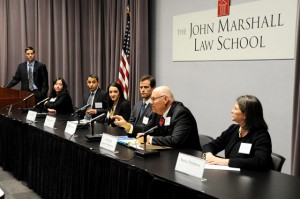
United States District Court Chief Judge James Holderman (second from right) makes a point at the Richard Linn American Inn of Court program on the importance of professionalism and civility in the legal community on Nov. 17, 2011, at The John Marshall Law School. The event was the Inn's annual service project. Joining Holderman as panelists were (from left) Steven Reynolds (at podium) of DLA Piper; Julianne Hartzell of Marshall Gerstein; Wasim Bleibel of Levenfeld Pearlstein; Kristina Swanson of Wood Phillips; Matthew Nielsen of Marshall Gerstein; and Monica Thompson of DLA Piper.
A lawyer’s integrity and reputation are what will make your career in the legal profession, according to panelists at a program on professionalism and civility in the legal profession presented by the Richard Linn American Inn of Court at a program Nov. 17, 2011, at The John Marshall Law School.
The event was the Inn’s annual service project.
United States District Court Chief Judge James Holderman was joined on the panel by Steven Reynolds and Monica Thompson of DLA Piper; Julianne Hartzell of Marshall Gerstein; Wasim Bleibel (JD ’11) of Levenfeld Pearlstein; Kristina Swanson (JD ’11) of Wood Phillips; and Matthew Nielsen of Marshall Gerstein.
Special assistance was provided by Richard Linn members Scott Burow (JD ’97) of Banner & Witcoff; Angelina Filippo (JD ’08), principal at Angelina M. Filippo, Attorney at Law; Lisa Iverson (LLM ’98) of Neil & McDevitt; and third-year students Merritt Hasbrouck and Andrea Fuelleman supported from the crowd.
Holderman stressed two points for the student audience: no client or result is worth the sacrifice of one’s integrity and an attorney should be able to make a forceful argument while balancing his zeal for the client’s position. An attorney with an impeccable reputation makes the most forceful argument before a court because he or she exudes trustworthiness, Holderman stressed, and that makes the argument one the court can rely on.
Panelists also gave students insights on how to remain civil and professional when dealing with one’s own colleagues, as well as those you interact with at the courthouse. Students also got to hear stories from the speakers about the lingering consequences of being “that attorney” who violates the standards of professionalism, and how difficult it is to repair a reputation in that instance.
The discussion of professionalism and civility transitioned into a colloquy about moving from law school into the practice of law. Speakers discussed some of the nuances of the hiring process, and provided pointers on what attorneys look for in interviews. Panelists impressed upon the students that “the practice of law is different” today. Consequently, it is important to create one’s own identity and maintain a solid reputation within the legal community.
Students also received tips on maintaining a diverse practice; how to be assertive without becoming over-bearing; and what are the practicalities of transitioning from one sector of practice to another.
